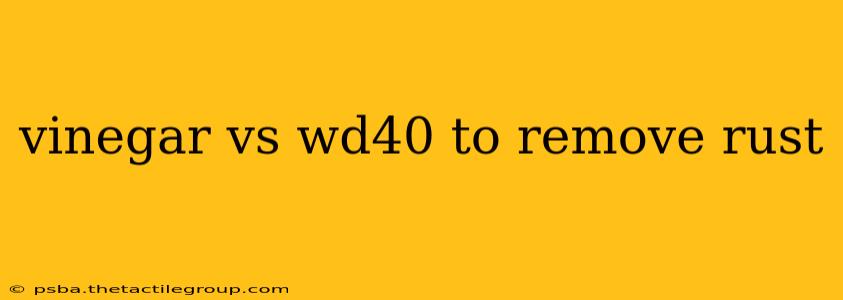Rust. That insidious orange scourge that attacks metal, leaving behind pitted surfaces and compromised structural integrity. Whether it's a cherished antique, a rusty garden tool, or a vital piece of machinery, rust removal is often a necessary evil. Two common household contenders frequently enter the fray: vinegar and WD-40. But which one truly holds the crown in the battle against rust? This detailed comparison will delve into the effectiveness, pros, and cons of each method, helping you choose the right weapon for your rust-removal arsenal.
Understanding the Enemy: Rust and its Removal
Before we pit vinegar against WD-40, let's understand the enemy. Rust is iron oxide, a chemical reaction between iron and oxygen in the presence of water. Removing rust involves breaking down this chemical bond. Both vinegar and WD-40 approach this problem differently, making their effectiveness dependent on several factors including the severity of the rust, the type of metal, and the desired outcome.
Vinegar: The Gentle Giant of Rust Removal
Vinegar, primarily acetic acid, works through a chemical process called chelation. The acetic acid in vinegar reacts with the iron oxide, slowly dissolving the rust and converting it into a soluble compound that can be washed away.
Pros of Using Vinegar:
- Accessibility and Cost-Effectiveness: Vinegar is readily available and inexpensive, making it a budget-friendly option for tackling light to moderate rust.
- Gentle on Metal: Compared to harsher chemicals, vinegar is relatively gentle, minimizing the risk of damaging the underlying metal. This is particularly important for delicate or antique items.
- Environmentally Friendly: Vinegar is a natural and biodegradable substance, making it a more environmentally conscious choice than many commercial rust removers.
Cons of Using Vinegar:
- Slow Process: Vinegar requires patience. Removing significant rust can take several hours, days, or even weeks, depending on the severity.
- Not Suitable for Heavy Rust: Vinegar is ineffective against deeply embedded or heavy rust. It's best for tackling surface rust.
- Requires Multiple Applications: Multiple applications and soaking are often necessary for noticeable results.
WD-40: The Multi-Purpose Marvel (with Rust-Fighting Limitations)
WD-40, while a household staple with a multitude of uses, isn't specifically designed as a rust remover. Its effectiveness against rust is more about lubrication and displacement than actual rust removal. It helps loosen rust particles, making them easier to remove mechanically (like scrubbing or scraping).
Pros of Using WD-40:
- Penetration: WD-40's ability to penetrate tight spaces can help loosen stuck, rusty parts.
- Lubrication: Once the rust is loosened, WD-40 can lubricate the moving parts, preventing further rust and improving functionality.
- Ease of Application: The spray can makes application quick and convenient.
Cons of Using WD-40:
- Not a true Rust Remover: WD-40 doesn't chemically dissolve rust; it merely displaces water and loosens debris.
- Ineffective against Heavy Rust: For heavily rusted items, WD-40 will likely offer minimal improvement.
- May Leave a Residue: WD-40 leaves a residue that may need to be cleaned off after application.
The Verdict: Choosing the Right Tool for the Job
The best choice between vinegar and WD-40 depends entirely on the specific situation:
- For light to moderate surface rust on small items: Vinegar is an excellent and environmentally friendly option.
- For loosening stuck, rusty parts or providing lubrication after removing loose rust: WD-40 is a helpful addition to the process.
- For heavy rust or deeply embedded rust: Neither vinegar nor WD-40 is likely to be effective on their own. More aggressive methods like chemical rust removers, sandblasting, or electrolysis may be necessary.
Remember always to wear appropriate protective gear, like gloves and eye protection, when working with any rust removal method. Proper preparation and patience are key to success in the battle against rust.

